Journal Articles by Sarah Prestridge
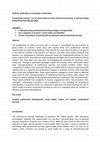
Computers and Education, 2019
The proliferation of online resources and an increase in accessibility has led teachers to going ... more The proliferation of online resources and an increase in accessibility has led teachers to going online to connect, share ideas and expand their own professional learning opportunities on social media platforms. Over the last five years there has been a resurgence in this field to research what teachers are doing in and with social media. Knowing that teachers are networking or collecting resources misses the fundamental premise for such action, which in turn, does little for understanding social media use as a professional learning activity. This study takes one step back, to investigate the reasoning for particular social media use. Through a qualitative paradigm, expert ICT teachers were interviewed about their conceptualisations of professional learning and related activities online. These recognized ICT-experts from Australia, Europe and United States of America were purposely selected due to a personal and professional impetus to maintain currency with innovative ideas in this ever-changing field. These expert teachers engaged in social media in different ways based on their conceptualisations of professional learning in these online spaces. The findings present a typology of reasoning based along two continuums, Self and Interactivity. These axioms defined four categories of teacher engagement online: Info-consumer; info-networker; self-seeking contributor; and vocationalist. A new paradigm of professional development is presented which has important implications for understanding the role of social media in teacher professional learning as well as in reshaping what we consider as effective professional development.

Technology, Pedagogy and Education, 2019
With the permeation of the Internet in teacher’s personal and professional life, teachers are goi... more With the permeation of the Internet in teacher’s personal and professional life, teachers are going online to connect, share ideas and expand their learning opportunities. This qualitative study focuses on the use of digital applications that leverage opportunities for teachers in the design phase, that is, at the time they are developing and curating curriculum materials and designing learning sequences within their discipline areas before implementation in the classroom. Data drawn for this paper is part of a research project examining expert ICT teacher’s approaches to their ongoing online professional learning. Semi-structured interviews of internationally recognized ICT-expert, specifically from Australia, Europe and United States of America are the main data source. The findings suggest that each teacher leveraged their online social media as their first approach or starting point within their design activities, with a curiosity to investigate the pedagogical application of a ‘new’ tool. These teachers looked first to the expertise of the colleague for their recommendation of the tool, engaging in little pedagogical reasoning before implementation. Additionally, elaboration of the term sharing is provided for deeper understandings of the ways teachers engage in their professional learning networks.
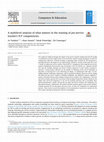
Computers & Education, 2018
Few empirical studies investigate the impact of pre-service teachers’ background and ICT profile ... more Few empirical studies investigate the impact of pre-service teachers’ background and ICT profile in combination with the support they receive from their teacher training institution on their ICT competencies. Moreover, research focusing on preparing future teachers for ICT integration is generally limited to the impact of one single strategy. Therefore, the aim of this study was to test a model to explain pre-service teachers' perceived ICT competencies that integrates pre-service teachers’ background characteristics (age and gender), their ICT profile (e.g., attitudes towards ICT) and the multiple strategies pre-service teachers experience in their teacher training institution: 1) using teacher educators as role models, 2) reflecting on the role of technology in education, 3) learning how to use technology by design, 4) collaboration with peers, 5) scaffolding authentic technology experiences, and 6) continuous feedback. Based on a survey among 931 final-year pre-service teachers in Flanders (Belgium), the multilevel analyses indicated a positive association between the strategies and pre-service teachers’ ICT competencies. The more pre-service teachers perceive the occurrences of the strategies during their teacher education, the higher their perceived competence to use ICT for learning processes and to strengthen their instructional practice. Gender and age did not affect pre-service teachers’ ICT competence for educational practice. Furthermore, the results revealed a positive impact of pre-service teachers’ attitudes towards ICT (in education) and ease of use, on their ICT competence for educational practice. These results can provide guidance for the preparation of pre-service teachers for the 21st century learning environments with new technologies.
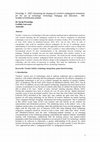
Technology, Pedagogy and Education, 2017
Teachers' current uses of technologies still tend to replicate traditional and or administrative ... more Teachers' current uses of technologies still tend to replicate traditional and or administrative practices, with research indicating that the pedagogies required for the effective integration of educational technologies is not yet in evidence amongst the majority of teachers (). In order to conceptualise what could be considered effective pedagogies for the use of technology greater understanding of what informs teachers' particular approaches and how teachers come to change their approaches over time is required. Succinctly, what is needed is a deep understanding of a teacher's developmental process for their conceptualisation of the relationship between technology and pedagogy. Through an in-depth, two-year case study methodology, three teachers' journey to use game-based technologies in their classrooms was examined. The results provide valuable insights into the relationship between teachers' pedagogical beliefs and practices about the use of technologies; trigger points in teachers' journeys that influence change in their pedagogical orientation for the use of technology; and rich stories of innovation in teaching. This study has implications for teacher professional development and supporting effective technology integration.
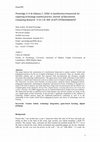
This paper theorises the construction of a classification framework to explore teachers' beliefs ... more This paper theorises the construction of a classification framework to explore teachers' beliefs and pedagogical practices for the use of digital technologies in the classroom. There are currently many individual schemas and or models that represent both developmental and divergent concepts associated with technology enabled practice. This paper draws from a depth of literature in this field to synthesise a classification framework used as an analytic tool to interpret technology enabled practice. The framework was drawn from literature covering teachers' epistemic beliefs, pedagogical beliefs, pedagogical approaches, technological competency and perceived levels of learning. It emerged as a result of the need to analysis case study data from a large-scale research project into the effective use of digital games in the classroom: Serious Play: Digital Games, Learning and Literacy for twenty first century schooling. Yin (2009) suggests the use of a uniform framework to enable cross-case synthesis. The framework provides an analytical tool to help interpret why and how teachers are using, in this case, digital games in their classrooms. It also provides a significant contribution to the variances in technology enabled practice along the traditional-constructivist continuum as well as to the relationship in how teacher beliefs direct pedagogical practice and choice of technologies used for learning.
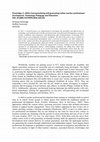
In 2012, a research project was implemented to investigate the possibility and effectiveness of i... more In 2012, a research project was implemented to investigate the possibility and effectiveness of instituting a personalised and virtually networked mode of professional development to promote teacher confidence and competence with Information and Communications Technology (ICT) and its use as a key component of teachers' pedagogy. The aim of the project was to examine an online mode of professional development where a network of teachers was built without any face-to-face contact and where the approach for professional development was personalised and self-directed. Six geographically dispersed schools in Queensland were involved, with twelve teachers participating over the school year supported by a mentor. Findings reveal that teachers operated in an independent manner, acknowledging community but taking from rather than contributing to the generation of co-created knowledge. Implications drawn from the case studies suggest that greater milestone setting, multiple levels of leadership and special interest groups are required to support interaction between users and content while still maintaining an agile approach.
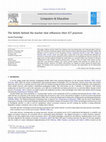
Computers & Education, 2012
This paper explores teacher beliefs that influence the ways Information and Communications Techno... more This paper explores teacher beliefs that influence the ways Information and Communications Technologies (ICT) are used in learning contexts. Much has been written about the impact of teachers' beliefs and attitudes to ICT as 'barriers' to ICT integration . This paper takes a closer look at the types of beliefs that influence ICT practices in classrooms and the alignment of these beliefs to current pedagogical reform in Australia. The paper draws on data collected through the initial phase of a research project that involved an Industry Collaborative of four Catholic primary schools (prepgrade 7). Data are drawn from teacher surveys, interviews and document analysis. The results present specific links between ICT beliefs that are informing teachers' practices. ICT beliefs and practices are aligned to reform agenda for digital pedagogies. The findings of this research inform teacher ICT practice and requirements for ICT professional development.
There is wide agreement that teacher professional development (TPD) is a necessary element in edu... more There is wide agreement that teacher professional development (TPD) is a necessary element in educational change, especially for the more effective application of technology to enhance learning. The research literature reports many examples of successful TPD but there remain many challenges to wider and deeper success in the variety of different contexts. Discussion by the thematic working group on TPD at EDUsummIT 2015 in Bangkok identified several challenges to successful TPD. This paper discusses those challenges, describes four cases of successful TPD from varied contexts, and derives a model for TPD based on observed commonalities in the cases.
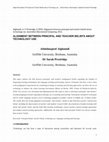
This paper explores the link between principals' and teachers' pedagogical beliefs regarding the ... more This paper explores the link between principals' and teachers' pedagogical beliefs regarding the benefits of integrating learning technologies into language teaching and learning contexts. Principals who have a clear vision of the pedagogical requirements for technological change in teaching and learning approaches can direct the use of technology to enhance the school learning environment (Baylor & Ritchie, 2002; Ertmer & Ottenbreit-Leftwich, 2010). Two surveys were developed and implemented for this study in order to determine principals' and teachers' existing pedagogical beliefs regarding technology use in teaching and learning. Participants included 67 principals and 82 Arabic language teachers across technology-equipped secondary schools in Jeddah city, in Saudi Arabia. The results show the strong alignment of principals' and teachers' beliefs in that both have positive constructivist beliefs, including the improvement of teachers' and students' research skills, the promotion of student learning both inside and outside school, and the belief that learning technologies convert teacher-centred teaching approaches into student-centred teaching approaches. Additionally, the study shows that principals' beliefs were always stronger than teachers' beliefs.
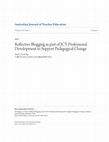
Australian Journal of Teacher Education, 2014
Reflection is considered an inherent part of teacher practice. However, when used within professi... more Reflection is considered an inherent part of teacher practice. However, when used within professional development activity, it is fraught with issues associated with teacher confidence and skill in reflective action. Coupled with anxiety generally associated with technological competency and understanding the nature of blogging, constructive reflection is difficult for teachers. This paper focuses on the reflective quality of school teachers' blogs. It describes teachers' perceptions and engagement in reflective activity as part of an ICT professional development program. Reflective entries are drawn from a series of blogs that are analysed qualitatively using three levels of reflection-on-action. The findings suggest that each level of reflective action plays a different role in enabling teachers to transform their ICT pedagogical beliefs and practices. Each role is defined and illustrated suggesting the value of such activity within ICT professional development, consequently reshaping what constitutes effective professional development in ICT.
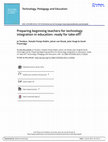
The overall aims of this study are to explore 1) how beginning teachers integrate technology in t... more The overall aims of this study are to explore 1) how beginning teachers integrate technology in their practice and 2) the connections between teachers’ technology uses and their pre-service education programs. Data of this follow-up study were collected through in-depth interviews with beginning teachers. The results revealed that all beginning teachers used a wide range of technological applications, mainly for structured learning approaches, while few created opportunities for student-centred technology use. Further, pre-service learning experiences that impact graduate teachers’ technology are identified. While teacher educators modelling technology use are an important motivator for beginning teachers to use technology in their own teaching, field experiences seem to be the most critical factor influencing their current practice. Based on the results of this study, recommendations about how to prepare and support pre-service and beginning teachers for technology integration are discussed.
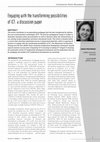
Australian Educational Computing, 2007
This article contributes to conceptualising pedagogy that has been transformed by information and... more This article contributes to conceptualising pedagogy that has been transformed by information and communications technologies (ICT). The push for pedagogical change is evident in Australian education policy documentation as well as literature about the characteristics of our existing student population and future educational trends. This article is situated within a current state education reformation process in Queensland Australia, which is requiring all teachers to engage with the transforming possibilities of ICT. The Department of Education, Training and the Arts (DETA) Smart Classroom Professional Development Framework (2007b) requires teachers to move from 'integrating' ICT in learning to making ICT 'integral' to learning. An examination of this ICT professional development framework and the implications this has for pedagogy and models of ICT professional development are presented.
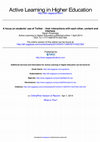
Active Learning in Higher Education, 2014
In their advertising campaigns, universities depict students using computers, laptops, mobile pho... more In their advertising campaigns, universities depict students using computers, laptops, mobile phones, iPads and tablets as learning devices. Regardless of the marketing used, there is value in enlisting the advantages of any medium that can aid deep thinking and increase student engagement. This study offers new knowledge about conceptualising Twitter as a knowledge construction tool leveraged through mobile devices. A qualitative approach was conducted to investigate the learning outcomes of students' use of Twitter when it was implemented as a learning device. The use of Twitter was investigated to provide insight into the ways students and instructors interacted in this environment, how the content was made active and how the functionality of the tool and its conceptualisation impedes and/or supports the learning process. The results indicate that student-initiated interaction supported by instructor use of participatory pedagogies enables substantive dialogue through Twitter and that paraphrasing was the most common way students made learning active.

E-Learning and Digital Media, 2014
ABSTRACT Teachers' beliefs about what it is (or is not) possible to achieve with digital ... more ABSTRACT Teachers' beliefs about what it is (or is not) possible to achieve with digital games in educational contexts will inevitably influence the decisions that they make about how, when, and for what specific purposes they will bring these games into their classrooms. They play a crucial role in both shaping and responding to the complex contextual factors which influence how games are understood and experienced in educational settings. Throughout this article the authors draw upon data collected for a large-scale, mixed-methods research project focusing on literacy, learning and teaching with digital games in Australian classrooms, to focus explicitly on the attitudes, understandings and expectations held about digital games by diverse teachers at the beginning of the project. They seek to identify the beliefs about games that motivated teachers' participation in a digital games research project while focusing, as well, on concerns that teachers express about risks or limitations of such a project. The authors' aim is to develop a detailed picture of the mindsets that teachers bring to games-based learning environments, and the relevance of these mindsets to broader debates about the relationship between games, learning and school.
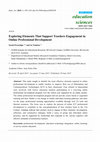
This study sought to identify the most effective elements required in online professional develop... more This study sought to identify the most effective elements required in online professional development to enable teachers to improve their use of Information and Communications Technologies (ICT) in their classrooms. Four schools in Queensland were involved, with twelve classroom teachers participating in a year-long online professional development program over the school year supported by an online mentor. The online professional development program did not provide course based or sequential learning activities. Rather it was design to enable individual learning pathways and draw on the many professional learning opportunities available through web 2.0 tools and Internet resources. The focus was to explore the process of online ICT professional development to contribute to the conceptualization of how teachers learn in the 21st Century. Findings indicate that teachers need to engage in three elements: investigation, reflection, and constructive dialogue; build a sense of group and individual online presence; and be supported by mentorship that responds to the various cognitive and affective demands of autonomous learners.
Teaching and Teacher Education, 2010
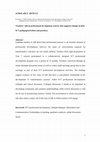
Teacher Development, 2009
Enabling teachers to talk about their professional practice is an essential element of profession... more Enabling teachers to talk about their professional practice is an essential element of professional development; however, the types of conversations required for transformative outcomes are not clearly defined. Teachers from eight Australian primary schools (grades 1–7) participated in a collaboratively designed information and communication technologies (ICT) professional development program over a period of 12 months. Teachers conversed through an online threaded discussion forum as well as within small and large group face‐to‐face meetings as part of their ICT professional development activities. The findings suggest evidence of two types of talk that have a concomitant relationship in the development of transformative practice within ICT professional development: collegial and critical discussion. Collegial discussion is found to be important in developing community and common understandings while critical discussion is vital for its role in transforming teachers’ beliefs. The environment in which conversations take place plays a major role in the type of talk in which teachers will engage. The findings of this research inform both ICT professional development for practicing teachers and the functioning and productivity of professional learning in online learning communities.
Watson, G. and Prestridge, S. (2003). A networked learning community approach to sustain teacher ... more Watson, G. and Prestridge, S. (2003). A networked learning community approach to sustain teacher ICT professional development. Australian Journal of Educational Technology, 19(2): 227-240.
Book Chapters by Sarah Prestridge
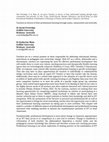
Engaging teachers in cooperative and collaborative processes through which they learn from each o... more Engaging teachers in cooperative and collaborative processes through which they learn from each other is fundamental in rethinking professional development as being ‘done’ to teachers compared with teachers ‘doing’ or driving their professional learning. This rethinking is underpinned by opportunities that have arisen through social networks and the pervasiveness of online media but also from the shift in valuing the exploration of individual interests and needs as well as in the pedagogical reform process. The tenents of effective professional learning, that being, active engagement, teacher voice, creation and collaboration, inquiry and reflection, will be explored in this chapter through two modes of discourse. First, a reckoning of what counts as professional learning activities is propositioned to establish the driving force or purpose for teacher learning. This is then developed further in the second part of this chapter where we discuss the various approaches to professional learning with a theoretical analysis of teacher collaboration, teacher teams, communities of practice and broader social networks. Understanding the genesis, development and purpose of professional engagement and interaction is key to supporting teachers as the ‘deliverers’ of educational reform who are those tasked with transforming education through ICT.
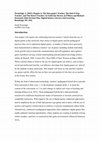
This chapter will explore the relationship between teachers’ beliefs about the use of digital gam... more This chapter will explore the relationship between teachers’ beliefs about the use of digital games in the classroom, their choice of digital games and the pedagogical practices they use to implement digital games. A number of factors have previously been demonstrated to influence teachers’ use of games including student motivation, social growth such as teamwork, communication and self-regulation, and cognitive gains in problem solving, content understanding and procedural knowledge (Garris, Ahlers & Driskell, 2002; Lacasa 2011; Pozo 2008; O’Neil, Wainess & Baker 2005). What a teacher thinks or believes the use of a digital game can achieve, such as these social and intellectual benefits, can influence and shape how digital games are ‘played’ by the students in their classrooms. This chapter will focus on why and how teachers use games and the effect this has on their own perceptions of who they are as teachers in the twenty first century.

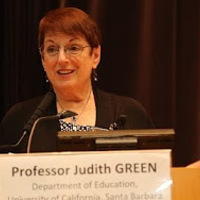









Uploads
Journal Articles by Sarah Prestridge
Book Chapters by Sarah Prestridge